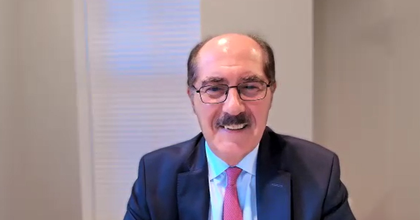Putin not Trump emerged the real winner from high stakes meet: Prof Klaus Larres
By IANS | Updated: August 16, 2025 16:30 IST2025-08-16T16:23:35+5:302025-08-16T16:30:10+5:30
New Delhi, Aug 16 In an exclusive interview with IANS from Washington, D.C., Professor Klaus Larres of the ...

Putin not Trump emerged the real winner from high stakes meet: Prof Klaus Larres
New Delhi, Aug 16 In an exclusive interview with IANS from Washington, D.C., Professor Klaus Larres of the University of North Carolina shared his candid views on the high stakes meeting between U.S. President Donald Trump and Russian President Vladimir Putin.
The discussion ranged from the optics of the encounter, possible agreements on Nuclear arms control, the future of the Ukraine war, to the geopolitical implications for Europe, India, and the global sanctions regime.
Prof. Larres offered a nuanced analysis of what the meeting meant for international diplomacy and who truly emerged as the political winner.
Here are the excerpts from the interview:
IANS: What is your first reaction to the meeting between Presidents Putin and Donald Trump and the statement they shared?
Larres: The whole scenario was pretty shocking. It began with a welcoming ceremony in which President Trump greeted President Putin like an old friend. They last met in 2019, but President Trump did not treat him as an opponent — rather, as if he were a family member. Then Trump gave Putin a ride in his presidential limousine. That was polite, but the fact remains we don’t know what they discussed privately in that car.
President Putin speaks English, so they must have had some conversation — perhaps small talk. There were also closed-door meetings between them about which we have no information. Afterwards, during the Press briefing, Trump referred to him simply as “Vladimir.”
IANS: During the statements, President Putin repeated his talking points and indicated he is not backing down from his maximalist goals. Do you see any change in the Russian position?
Larres: No, I don’t. No one really expected a major shift. Putin has not moved from his position at all. Many had hoped for a ceasefire — perhaps even a temporary one — but that clearly didn’t happen. It was said Putin would have to give Trump something so Trump could declare victory, but that doesn’t seem to be the case. Putin did bring a business delegation, and there were hints of potential business deals, but that’s entirely separate from the Ukraine war.
Even if Trump later announces huge business agreements, that wouldn’t end the war. Trump wants to be seen as a peacemaker and he wants to win the Nobel Peace Prize, but the reality is that war in Ukraine hasn’t stopped.
One possible area of agreement between Trump and Putin could be the extension of the New START Treaty, which expires in February 2026.
It’s the only Nuclear arms control treaty between the U.S. and Russia and limits both sides’ missiles and warheads. If they agreed to extend it, that would be a success — but it would still not end the Ukraine war. I believe some agreements may have been reached, but none related to ending the conflict.
IANS: Putin also said in his statement that he hopes whatever was agreed will not be “torpedoed” by Europe. How much pressure is Europe under?
Larres: It’s difficult to say because we don’t know the content of the agreements. If it’s about extending the Nuclear treaty, Europe wouldn’t oppose it. If it’s a business deal that undermines Ukraine, the Europeans would object. However, Europe is in a weak position because it depends heavily on the U.S., especially in the military domain. The ball is now in Trump’s court. Putin claims Russia has emerged stronger, including militarily, but that’s not the full truth — it hasn’t become weak either.
IANS: There’s irony in Trump welcoming Russian business leaders while the U.S. has sanctioned India for buying Russian oil.
Larres: Many Russian companies are sanctioned by both the U.S. and Europe. Taking a business delegation was highly unusual — it suggests Putin expected sanctions to be lifted or ignored. If that had happened, it would have been hard for Trump to justify secondary sanctions on countries like India or China. How do you explain sanctioning countries that buy Russian oil but not sanctioning the originator of that oil?
IANS: If you were in New Delhi right now, would you be breathing a sigh of relief?
Larres: Yes. If I were Prime Minister Modi, I’d expect at least short-term relief from secondary sanctions.
IANS: The U.S. is interested in resuming bilateral commercial relations with Russia. What does that mean for Europe?
Larres: It would put Europe in a difficult position. The EU has imposed 18 sanction packages — most implemented successfully, though not without internal disputes, especially from countries like Hungary and Slovenia. If the U.S. normalises trade with Russia, Europe’s hardline stance would weaken over time, ultimately undermining the EU sanctions regime. Putin knows this, and such a move would drive a wedge between the U.S. and Europe, and within the EU itself.
IANS: Given the optics, who do you think came out as the winner?
Larres: From a neutral perspective, I would say it was clearly President Putin. The optics showed both as strong leaders sharing the limelight. But in substance — no ceasefire, no end to the war — it’s clear Trump didn’t achieve his main objective.
Disclaimer: This post has been auto-published from an agency feed without any modifications to the text and has not been reviewed by an editor
Open in app